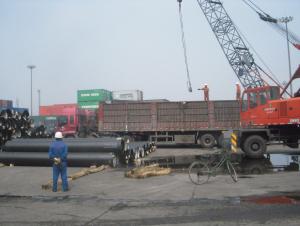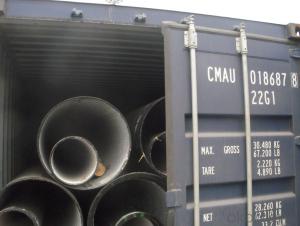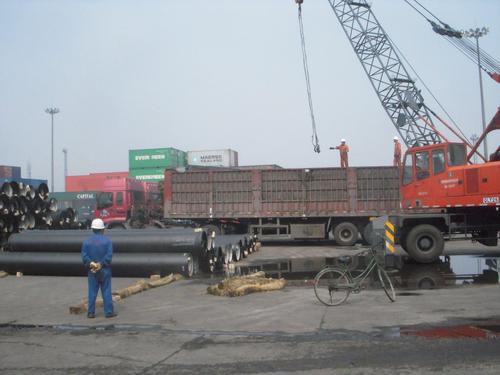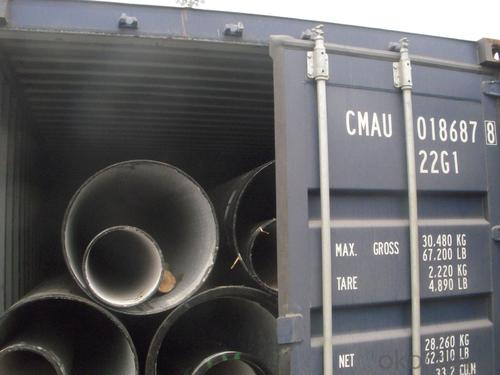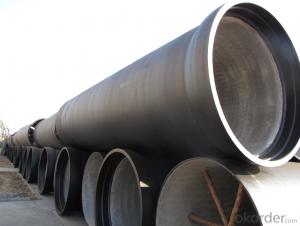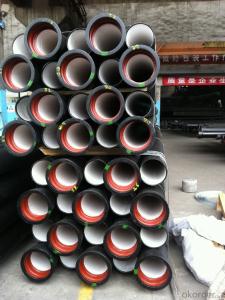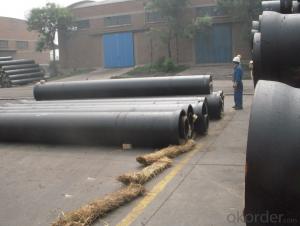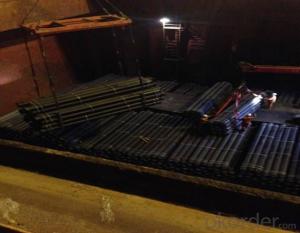DUCTILE IRON PIPE DN1000 K8 CLASS
- Loading Port:
- Tianjin
- Payment Terms:
- TT OR LC
- Min Order Qty:
- -
- Supply Capability:
- 30000Tons m/month
OKorder Service Pledge
OKorder Financial Service
You Might Also Like
CNBM ductile iron pipe ranges from DN80-DN1600mm (T-Type, Class K9), effective length 6m, comply with ISO2531 Standard
Company Profile
CNBM International Corporation is the leading production base and renowned supplier of Ductile Iron Water Pipe systems of both potable and waste water in China. We are constantly looking to develop high quality products to ensure the longest service life and wonderful performance.
CNBM Pipelines regard quality as the essential factor leading to successful business. Every pipe is tested in accordance with BS EN545 (water application) or BS EN598 (sewer application). CNBM Pipelines products comply with and are tested according to the relevant European and International Standards. Our pipes are manufactured under the quality management system BS EN ISO 9001. After years of efforts, CNBM Pipelines has built up great reputation in terms of quality and service among customers worldwide
Product Introduction
CNBM ductile iron pipe ranges from DN80-DN1600mm (Tyton, T-Type, Class K7/K8/K9), effective length: 6m, complying with BS EN545/EN598/ISO2531/BS4772.
Specification& Payment terms
Internal lining: Pipes shall have an internal cement mortar lining in acc with ISO4179.
External coating: Pipes shall be externally coated with metallic zinc spray plus a further layer of resin painting to ISO8179.
Gasket: 100% SBR/NBR/EPDM gasket in accordance with ISO4633.
Packing: Pipes from DN100 to DN300 be bundled with steel belts, the others are in bulk.
Payment term: By 30% T/T advance payment + 70% Irrevocable L/C at sight.
Packing: In bulk vessel or in container.
- Q: How are ductile iron pipes protected against interior corrosion?
- Ductile iron pipes are protected against interior corrosion through a process known as cement mortar lining. This involves applying a layer of cement mortar to the interior surface of the pipe. The cement mortar acts as a protective barrier, preventing the corrosive elements in the water or fluid from coming into direct contact with the iron material. To apply the cement mortar lining, the interior surface of the ductile iron pipe is first prepared by removing any loose scale or debris. Then, a cement mortar mixture is prepared by combining cement, sand, and water to form a paste-like consistency. This mixture is then applied to the pipe's interior surface using a spinning machine or manually by skilled workers. Once the cement mortar lining is applied, it is left to cure for a specific period of time, typically around 24 hours. During this curing process, the cement mortar hardens and forms a dense protective layer on the pipe's interior surface. The cement mortar lining offers various benefits in protecting ductile iron pipes against corrosion. It provides a smooth and continuous surface that prevents the water or fluid from directly contacting the iron material, reducing the risk of corrosion. Additionally, the cement mortar lining also helps to reduce the friction within the pipe, improving flow efficiency. Regular inspection and maintenance of the cement mortar lining are essential to ensure its effectiveness in preventing corrosion. Over time, the lining may develop cracks or deteriorate, which can compromise its protective properties. Therefore, it is important to periodically inspect the lining and repair or replace it as needed to maintain the integrity of the ductile iron pipes and prevent interior corrosion.
- Q: What are the different methods for tapping ductile iron pipe?
- There are several methods for tapping ductile iron pipe, including hot tapping, mechanical tapping, and electrofusion tapping. Hot tapping involves drilling into the pipe while it is still in service and creating a connection without interrupting the flow. Mechanical tapping uses mechanical equipment to create a threaded or grooved connection on the pipe. Electrofusion tapping uses an electrofusion saddle to create a connection by fusing a fitting onto the pipe.
- Q: Can ductile iron pipe be used for both water and wastewater applications?
- Ductile iron pipe is versatile and can be used for water and wastewater applications. It is made by treating iron with small amounts of magnesium, resulting in a material that is both flexible and durable. This flexibility and durability make it suitable for transporting both water and wastewater. Its high strength and resistance to corrosion make it ideal for underground applications. Ductile iron pipes can handle the high pressures and varying flow rates commonly found in water distribution systems, as well as the corrosive properties of wastewater. In addition, they have a longer lifespan compared to other materials like PVC or concrete, which are commonly used for water and wastewater projects. Therefore, ductile iron pipes are often chosen for reliable and long-lasting water and wastewater transport.
- Q: What is the expected service life of ductile iron pipe?
- The expected service life of ductile iron pipe can vary depending on various factors such as the environment, soil conditions, water quality, and the level of maintenance and corrosion protection measures implemented. However, on average, ductile iron pipe is designed to have a service life of 75 to 100 years. This is due to its superior strength, durability, and resistance to corrosion. Ductile iron pipe is known for its ability to withstand harsh conditions and has been used extensively in water and wastewater systems, industrial applications, and other infrastructure projects. Regular maintenance and proper corrosion protection can further extend the service life of ductile iron pipe, ensuring its continued reliability and performance over many decades.
- Q: How are ductile iron pipes protected against internal corrosion caused by chemicals?
- Ductile iron pipes are protected against internal corrosion caused by chemicals through the application of protective linings or coatings. These linings, such as cement mortar, polyethylene, or epoxy, create a barrier between the pipe and the corrosive chemicals, preventing direct contact and corrosion. Additionally, corrosion inhibitors can be added to the water or fluid being transported to further minimize the risk of internal corrosion. Regular inspection and maintenance also play a crucial role in identifying potential corrosion issues and taking appropriate preventive measures.
- Q: Do ductile iron pipes require cathodic protection?
- Indeed, cathodic protection is necessary for ductile iron pipes. Employing this technique safeguards metallic structures against corrosion by designating them as the cathode in an electrochemical cell. Ductile iron pipes face a high susceptibility to corrosion, particularly in harsh soil environments or when exposed to water that harbors substantial amounts of corrosive elements like chlorides or sulfates. By subjecting the pipe to a direct electrical current, cathodic protection effectively thwarts the innate corrosion process. This approach guarantees the durability and soundness of the ductile iron pipes, thereby diminishing the frequency of repairs or replacements.
- Q: Are ductile iron pipes resistant to hydrogen sulfide corrosion?
- Yes, ductile iron pipes are resistant to hydrogen sulfide corrosion due to their high resistance to chemical corrosion and their protective inner lining that prevents contact between the pipe material and the corrosive elements.
- Q: What is the weight of ductile iron pipes?
- The size and wall thickness of ductile iron pipes can cause their weight to differ. Roughly, a 6-inch diameter ductile iron pipe with a length of 10 feet can weigh around 180 pounds. Nevertheless, it is crucial to acknowledge that weight variations may occur among manufacturers due to disparities in their manufacturing techniques and materials. To obtain precise weight information, it is advisable to refer to the product specifications or reach out to the manufacturer.
- Q: Can ductile iron pipes be used in earthquake-prone areas?
- Yes, ductile iron pipes can be used in earthquake-prone areas. Ductile iron is a strong and flexible material that can withstand the ground movement and vibrations caused by earthquakes. It has excellent ductility, meaning it can deform without fracturing or breaking under stress. This property allows ductile iron pipes to absorb the energy generated during an earthquake, reducing the risk of pipe failure or rupture. Additionally, ductile iron pipes have been successfully used in seismic zones for many years, proving their resilience and reliability in such areas. However, it is important to note that proper installation and design considerations, such as using appropriate jointing methods and ensuring proper anchoring, are essential for ensuring the performance of ductile iron pipes in earthquake-prone areas.
- Q: Are ductile iron pipes suitable for installation in areas with high groundwater contamination and soil erosion?
- Ductile iron pipes are generally suitable for installation in areas with high groundwater contamination and soil erosion. This is because ductile iron pipes are known for their durability, strength, and resistance to corrosion. They have excellent resistance to acidic and alkaline soils, making them suitable for areas with high groundwater contamination. Furthermore, ductile iron pipes have a high resistance to soil erosion due to their robust construction. They are designed to withstand various external forces, including pressure from the surrounding soil and potential movement caused by erosion. This makes them a reliable choice for installation in areas prone to soil erosion. However, it is important to note that while ductile iron pipes can withstand high groundwater contamination and soil erosion, proper installation techniques and maintenance practices should be followed to ensure their longevity and optimal performance. Regular inspections, proper backfilling, and appropriate protective coatings should be employed to maximize the pipe's lifespan. In conclusion, ductile iron pipes are generally suitable for installation in areas with high groundwater contamination and soil erosion. Their durability, strength, resistance to corrosion, and high resistance to soil erosion make them a reliable choice for such environments. However, it is crucial to follow proper installation and maintenance practices to ensure their longevity and optimal performance.
Send your message to us
DUCTILE IRON PIPE DN1000 K8 CLASS
- Loading Port:
- Tianjin
- Payment Terms:
- TT OR LC
- Min Order Qty:
- -
- Supply Capability:
- 30000Tons m/month
OKorder Service Pledge
OKorder Financial Service
Similar products
Hot products
Hot Searches
Related keywords
